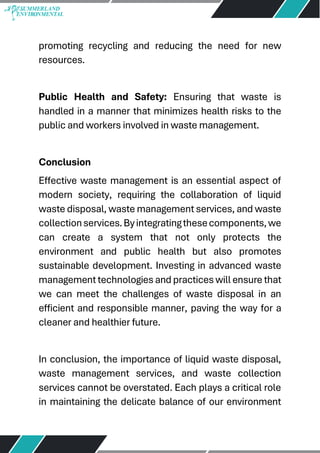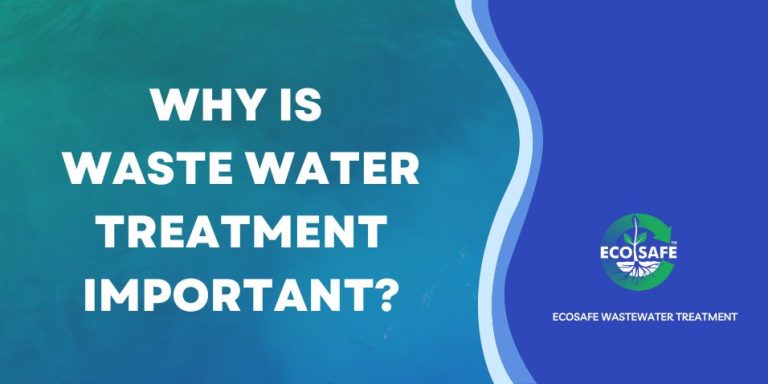Not known Factual Statements About Reclaim Waste
Not known Factual Statements About Reclaim Waste
Blog Article
The Ultimate Guide To Reclaim Waste
Table of ContentsThe Definitive Guide to Reclaim WasteThe Main Principles Of Reclaim Waste The Ultimate Guide To Reclaim WasteNot known Details About Reclaim Waste The Ultimate Guide To Reclaim Waste
Discover the types, occurrences, and kinds of fluid waste. Domestic sewer waste refers to the waste and products from a residential septic system. This kind of waste is created by human beings in houses, schools, and various other buildings. This only consists of septic containers that have a drain area. The appropriate management and disposal of residential sewage waste call for liquid waste to be moved to a sewage treatment plant where the correct approaches and equipment are related to purify and throw away waste.
Industrial waste often consists of possible risks, such as combustible materials or a blend of fluid and solid waste products, and calls for a more sophisticated and detailed disposal process. The disposal of business waste typically includes the purification of waste before transportation to make certain safe and appropriate disposal. Hazardous waste is created from by-products and drainage of commercial processes and production.
This sort of waste can not make use of the very same sewer monitoring transportation or procedures as septic or business fluids. The hazardous waste management process needs the examination and screening of fluid waste before it undergoes the disposal process (liquid waste disposal melbourne). Overflow waste is the liquid waste that comes from overflow and excess stormwater in extremely booming locations or cities
Runoff waste can trigger contamination and flooding if not handled properly. Making certain correct waste monitoring can avoid catastrophes and minimize environmental harm.
The Ultimate Guide To Reclaim Waste
Get in touch with PROS Services today to discover our waste management and disposal solutions and the correct means to take care of the liquid waste you generate.
(https://www.goodreads.com/user/show/183557660-leon-aube)Do you understand what happens to your water when you draw the plug, flush the toilet or drain the washing maker? No? Well, it deserves knowing. This so-called 'wastewater' is not just a crucial resource yet, after therapy, will be launched to our land, waterways or the sea. Utilized water from toilets, showers, bathrooms, kitchen sinks, washings and industrial procedures is understood as wastewater.

water made use of to cool equipment or clean plant and tools). Stormwater, a form of wastewater, is drainage that flows from farming and urban locations such as roofing systems, parks, yards, roads, courses and gutters into stormwater drains pipes, after rain. Stormwater streams without treatment straight to regional creeks or rivers, at some point reaching the ocean.
A Biased View of Reclaim Waste
In Queensland, most wastewater is treated at sewage treatment plants. Wastewater is transported from domestic or industrial sites through a system of drains and pump terminals, referred to as sewage reticulation, to a sewer treatment plant. City governments build, preserve and operate most sewage therapy plants. Operators are accredited under the Environmental Management Act 1994 to discharge treated wastewater at an acceptable environmental standard into waterways.
The Department of Natural Resources encourages regional federal governments about managing, operating and keeping sewage systems and therapy plants. In unsewered locations, city governments may require householders to mount specific or house sewer therapy systems to treat domestic wastewater from toilets, cooking areas, bathrooms and washings. The Division of Natural Resources authorises using house systems when they are confirmed to be reliable.
A lot of stormwater gets no treatment. In some brand-new communities, therapy of some stormwater to eliminate litter, sand and crushed rock has actually begun making use of gross toxin traps. Wastewater treatment takes place in 4 stages: Removes strong matter. Larger solids, such as plastics and various other things mistakenly discharged to sewers, are gotten rid of when wastewater is travelled through screens.
Uses small living microorganisms knows as micro-organisms to damage down and get rid of remaining liquified wastes and great particles. straight from the source Micro-organisms and wastes are integrated in the sludge.
The 2-Minute Rule for Reclaim Waste
Nutrient removal is not available in any way sewer therapy plants due to the fact that it calls for expensive specialised equipment. It is ending up being a lot more typical in Queensland. Clear fluid effluent generated after therapy might still have disease-causing micro-organisms. If this effluent is launched right into rivers such as rivers or the sea, the micro-organisms will at some point pass away out.

Many wastewater flows into the sewage system. Under the Act, regional federal governments carry out approvals and licences for ecologically appropriate tasks (Ages) involving wastewater launches that might have a neighborhood effect.
Not known Facts About Reclaim Waste
Or else, samples are considered research laboratory evaluation. Often lots of examinations are needed to establish the levels of each of the various toxins such as oils, heavy metals and chemicals in water. Surveillance offers accurate details about water high quality and can verify that permit problems are being met. The info gotten via monitoring offers the basis for making water high quality choices.
Report this page